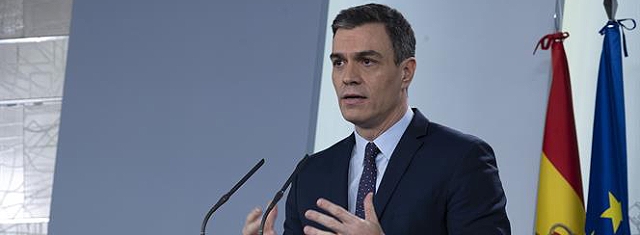Politics
Spanish Government mobilize 200,000 million Euros against COVID19
20% of GDP

Pedro Sánchez (Source: Moncloa Palace)
USPA NEWS -
The Spanish Council of Ministers approved on Tuesday a Royal Decree-Law of extraordinary urgent measures to face the economic and social impact of COVID-19. This rule reinforces the initiatives implemented in the exceptional measures plan agreed last Thursday.
The PM announced that the Government will mobilize up to 200,000 million Euros, about 20% of the Gross Domestic Product (GDP), to face the consequences of the coronavirus. 117,000 million Euros will be entirely public and the rest will be complemented by the mobilization of private resources. Pedro Sánchez insisted that it is the largest mobilization of economic resources in the history of democracy: "It is an enormous and determined effort that responds to the magnitude of the social and economic challenge we are facing and the commitment of the Government of Spain to the citizens. We will spare no effort. We will not leave anyone behind," he explained in a public appearance. The announced measures focus on four priority areas: families, workers, companies and research.
The President announced that the Government will allocate 600 million euros to finance basic benefits for social services in the autonomous communities and town halls, with special attention to home care for elderly and dependent people. In addition, protection will be extended to energy and water supplies, and telecommunications services will be guaranteed. In order to guarantee the right to housing, a moratorium is established in the payment of mortgage payments for debtors in a situation of special vulnerability: "No person in a difficult economic situation will lose their home. In this crisis, nobody he will be evicted from his home," said Pedro Sánchez.
Job protection
The set of measures aimed at reinforcing employment protection, according to the President of the Spanish Government, contemplates that salaried workers can adapt or reduce their working hours to meet the reconciliation needs derived from this crisis. Also, teleworking is established as a measure of flexibility, when circumstances allow.
Temporary staff adjustments will be managed through the Temporary Employment Regulation Files (ERTES in Spanish), which will benefit all workers. "ERTES caused by the coronavirus crisis will be considered force majeure and, additionally, workers will be entitled to contributory unemployment benefit, even if they do not meet the required prior contribution requirement," explained Pedro Sánchez. In addition, access to the cessation of activity for the self-employed is made more flexible, which will be compatible with the exemption of payments to Social Security. This group will have facilities so that it can quickly receive a benefit in case of economic difficulty.
Spanish PM stressed that these measures prioritize the suspension of contracts and the reduction of working hours as an option against the dismissal of workers and urged employers not to fire their employees: "We want to keep employment, that companies know that the Government will help them overcome this temporary crisis," he said.
Shielding against foreign investors
The President of the Spanish Government assured that "the State will provide the business fabric with all the liquidity it needs to stay operational" and will not allow "temporary liquidity problems to become solvency problems." To this end, the Government approved the creation of a line of public guarantees and guarantees worth up to 100,000 million Euros, which will allow mobilizing between 150,000 and 200,000 million in the economic system if the private sector is also incorporated.
Likewise, additional guarantees of 2,000 million Euros have been agreed for exporting companies, it will facilitate the restructuring of credits to farms affected by drought and the implementation of programs to support digitization will be accelerated. Public administrations will help their contractor companies to mitigate the consequences of COVID-19 on public sector contracts. The Executive has also reformed the regulations on foreign investments to prevent companies from countries outside the European Union from taking control of Spanish entities in strategic sectors, taking advantage of the conjunctural drop in the value of their shares.
The President of the Spanish Government will appear this Wednesday in the Congress of Deputies to account for the Royal Decree declaring the state of alarm, as established in Article 116.2 of the Constitution. Sánchez pointed out that in the spirit of the Government is that "the alarm lasts as little as possible," but he did not rule out having to request its extension: "we will re-evaluate the situation, always backed by scientific criteria and with the aim of preserving the health of all citizens," he said. For the extension, the authorization of the Lower House is necessary.
Pedro Sánchez emphasized the decisive role of Congress also in the approval of the next state budgets for which, he said, he will negotiate with all political forces. They must be, he announced, "of social and economic reconstruction, and that imply having overcome the virus and placing ourselves looking to the future and recovering economic and social vigor and normality in our lives." Similarly, the President appealed to the commitment of the European Union to endow fiscal plans with economic resources to alleviate this crisis, attend to health emergencies and, once the time for recovery has come, promote it with public aid.
Liability for this article lies with the author, who also holds the copyright. Editorial content from USPA may be quoted on other websites as long as the quote comprises no more than 5% of the entire text, is marked as such and the source is named (via hyperlink).






